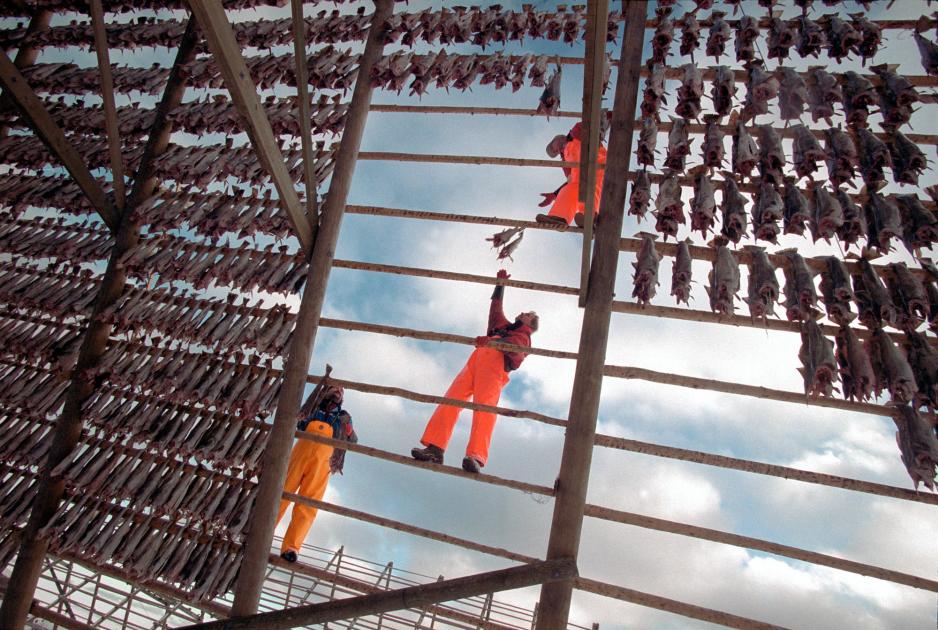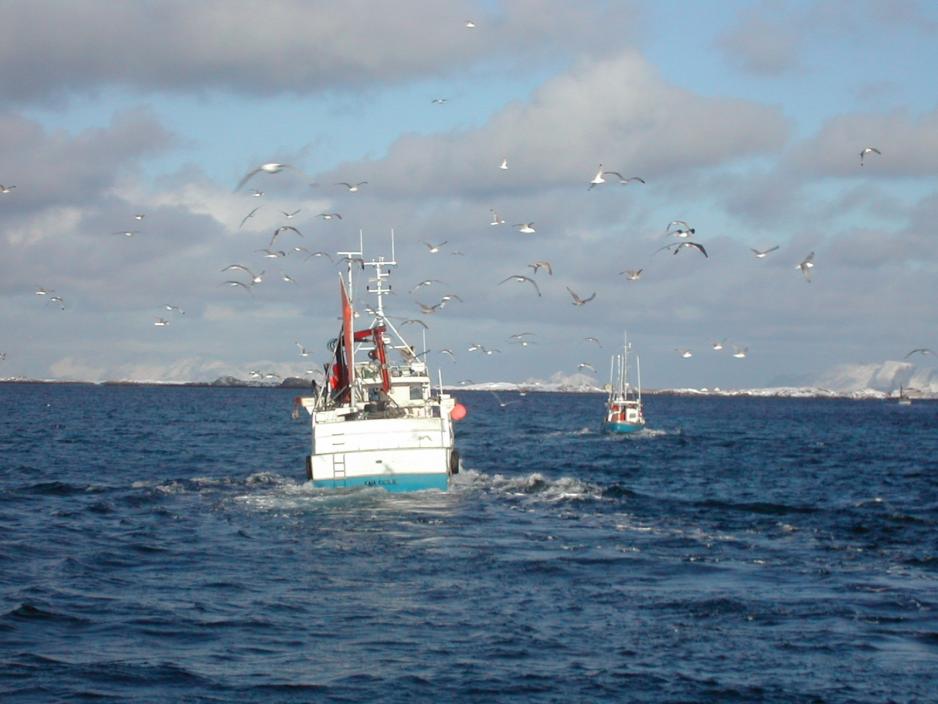Northern Business and Industry About the Corona Effect: - The Situation is Radically Changed

Cod hanging to dry for it to become stockfish later in the year. (Photo: Jean Gaumy/Norwegian Seafood Council)
While tourism operators face cancellations and reduced activity, it is also becoming harder for producers and suppliers in the seafood industry to export goods. The situation for Arctic tourism as well as the fisheries and seafood industries has changed after the corona virus outbreak.
“We notice it mainly in demand from customers. This was to be the peak of the season, but we sell less now than we normally do”, says Steinar Eliassen, Chairperson of the Board of the fish buyers’ association and CEO of Norfra, to High North News. Norfra is a Tromsø-based company with production located several places in Troms and Finnmark.
The company refines and exports cod, grayfish, haddock and other white fish. Norfra’s market is mainly Western Europe, thought he company also supplies to other countries such as e.g. South Korea and Japan.
Eliassen says the situation is radically changed from what would be the normal situation in March, which is the peak of the cod-fishing season. He says production is maintained and that there is no immediate halt; however, they notice significantly reduced demand from the market.
How will restrictions on flying affect you in the coming time?
“We estimate that it will put a full stop to the export of live crabs, and also restrict normal business travels”, Eliassen says.
Norfra survives, taking precautions
When asked what the corona situation means for the company’s economy if this were to continue, Eliassen responds that Norfra is a solid company.
“We can manage a bad year without too big problems.”
Long-haul trucks transport processed fish from the factory to destinations in Europe. Eliassen says there have been limited logistical challenges so far, yet drivers have been asked to pay attention to the situation as it may worsen.
“We must assume that some drivers may get sick and that some could become more skeptical of transporting fish to some destinations”, he says.
When asked about the recent Norwegian currency drop, Eliassen says:
“Being an exporter, we secure the exchange rate for a part of the sale, in particular when we consider the Norwegian currency to be low. The Norwegian krone was already at record-low levels before the recent shock-deflation of some 10 percent. Thus, we are bound by deals that appeared to be good a week ago.”
Dialogue amongst actors vital
Eliassen says they have also had meetings with other buyers’ organizations as well as sales organisations.
“Many companies report being in a situation similar to that of Norfra. Work is ongoing to introduce a stop to fisheries during weekends”, he says in closing.
A press release from Norges Råfisklag, one of the main seafood selling organizations, on 10 March states that the organization has had a meeting with fish buyers’ organization to discuss the situation related to the corona virus and its consequences for the seafood industry. “Based on this, Norges Råfisklag encourages land and sea actors to maintain close dialogue in order to adjust the pace of fisheries and landings to the current market situation.”

Fisheries in Lofoten, Norway. Photo: Redningsselskapet/Flickr
Transport challenges and precautions
Seafood Norway says it notices that transport costs increase, and that logistics has become more challenging for parts of the seafood industry.
“We notice that transport costs increase, in particular to Asia, and logistics themselves have become more difficult. When transport is reduced on a general level, that will also hit our industry, which depends on exporting its goods. There could be massive delays”, CEO of Seafood Norway Geir Ove Ystmark explains to High North News.
Even though the seafood industry is not amongst the hardest hit industries as per today, such as e.g. tourism, the various actors take their precautions.
Many have introduced quarantine for production equipment, and job travels are canceled to make sure no infection gets to their employees. If infection were to occur in for instance fisheries and fish farming, production could be postponed, and companies would be left with too high biomass.
“The industry is taking the right precautions at an early stage. Protecting one’s employees is a high priority. Thus, many now have placed quarantine restrictions on incoming equipment, in addition to canceling job trips”, he says in closing.
Tourism particularly exposed
Daniel Bjarmann-Simonsen, Regional Director of NHO Nordland, says this is growing to become an increasingly serious situation.
“More and more companies notice a drop in demand. Tourism is particularly at risk. The situation is constantly evolving. We are still on a level of quiet before the storm in Nordland, however, things are escalating. There will be layoffs in the future”, he says to High North News.
“Many companies are not affected yet, however, the fear of consequences is spreading. We also see many now worrying about the consequences of losing their employees to quarantine, or as a consequence of closed kindergartens and schools. Many production companies will be exposed to this, amongst others in production industries, as they often depend on minimum staffing. Companies we have been in touch with seem to handle this well and make plans to prepare for managing this development”, he says.
China has consequences
NHO, the Norwegian Confederation of Businesses, takes time to map the situation in order to provide the authorities with accurate information about what is happening.
Tourism is bigger in Northern Norway than the rest of the country. On a national level, tourism accounts for some three percent of GDP, whereas in Northern Norway it accounts for more than five percent. Some 10,000 people work in tourism in Nordland county alone, and they account for a creation of wealth of about NOK 10 billion.
“China is an engine, a hub in the world economy, and the situation there affects everyone exporting raw materials or processing goods. China is also the largest exporter of tourists, and this will of course affect tourism in Nordland”, Bjarmann-Simonsen says.
“We also see a lot of cancellations from other countries. Many business travelers who go to conferences and meeting places cancel their trips, and that triggers a chain effect hitting airlines, hotels, bars, restaurants and shopping in general. And this affects the entire value chain negatively”, he says in closing.






